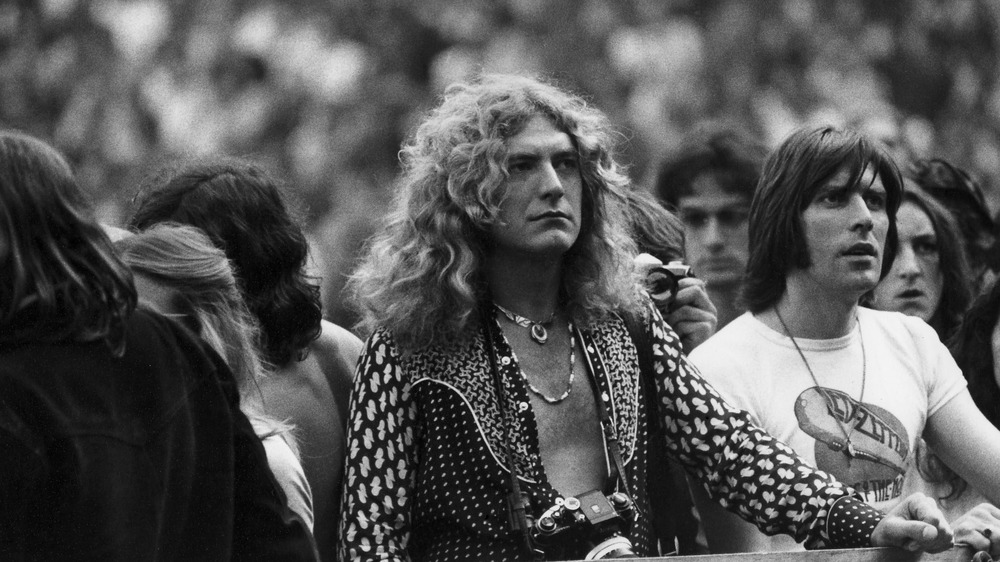Did Led Zeppelin Really Sell Their Souls To The Devil?
Ever since Christopher Marlowe published his play Doctor Faustus in 1604, Faustian bargains have become an immensely familiar part of our shared, Western folklore. In the play, a doctor named Faust makes a deal with a demon named Mephistopheles in exchange for necromantic power and knowledge, as Britannica outlines. Pretty standard stuff, by our measure, but that's only because of the play's impact.
Since then, "selling your soul to the devil" in exchange for knowledge, power, fame, or success has become a tried-and-true storytelling convention that's been explored in prestige horror like The Witch, comic books like Spawn and Ghost Rider, mass-market blockbusters like Star Wars (give in to the dark side, young Skywalker), and songs like Bohemian Rhapsody by Queen. On one hand, Faustian bargains teach a very obvious Judeo-Christian moral of the dangers of losing humility in the face of pride. On the other hand, the story reflects a greater suspicion of those who come to success too easily, possibly even jealousy, and maybe more than a bit of the belief of the necessity of long-suffering in exchange for financial and personal gains.
So how does this relate to Led Zeppelin, exactly? Well, when they released "Stairway to Heaven" in 1971 (you know, that song everyone plays in guitar stores after Deep Purple's "Smoke on the Water" riff), no one took note of any "satanic" elements to the song. Folks just thought: hey, this is pretty cool. That is, until a preacher named Michael Mills rolled along in 1981.
The Satanic Panic finds a new rock and roll victim in Led Zeppelin
Led Zeppelin wasn't a band considered to be "satanic" back in the day, unlike the much more easily pegged-as-demonic-by-suburban-parents Black Sabbath. But, as Rock n Roll Zone points out, rock has always been associated with "evil" simply because it's inherently countercultural and rebellious, and therefore terrified moms and dads as far back as the 50s. It's the sad habit of the previous generations to malign anything that comes from younger generations, true, but the brashness and energy of rock, and its chunkier cousin metal, made this task especially easy.
So when the Satanic Panic hit the US in the 1980s — a flurry of accusations of ritual abuse stemming from a variety of sociocultural sources, as Vox recounts — folks starting looking for scapegoats to make them feel safer about their neighbors and whatever deviances were occurring behind closed doors. Enter backmasking: sounds on vinyl records meant to be heard once a record is played in reverse. As the BBC says, the Beatles were the first to popularize this practice, and it led to all sorts of weird conspiracy theories amongst the public, such as the Beatles predicting Paul McCartney's death (he's still alive, by the way).
Michael Mills the preacher, then, jumped on the backmasking and Satanic Panic bandwagon in 1981 and brought Led Zeppelin into the mix. Per Cheatsheet, he said that "Stairway to Heaven" contained the backmasked words, "master Satan," "serve me," and "there's no escaping it."
Led Zeppelin did not create backmasked satanic pacts
A year later, a different preacher, Paul Crouch, claimed to hear a much more thorough set of backmasked Led Zeppelin lyrics: "Here's to my sweet Satan / The one whose little path would make me sad, whose power is Satan / He will give those with him 666 / There was a little toolshed where he made us suffer, sad Satan."
The most disturbing part of this whole nonsense is not the supposed lyrics themselves, but whatever drove individuals such as Mills and Crouch to proselytize their "Led Zeppelin made a deal with the devil because of the funky phonetics on this record." It's another leap of logic and supposition entirely to then accuse Led Zeppelin's success of being the by-product of a Faustian bargain. Admittedly, this particular version of a Faustian bargain might not be cuckoo lunacy on the level of QAnon, but still... really. I mean, really. Have we never watched a single reality TV show where someone with no talent gains acclaim simply by allowing themselves to be filmed while being dramatic? (Low blow, I know.) There's a reason Led Zeppelin became popular, and it has to deal with talent, not hobgoblins. For their part, Led Zeppelin has refused to deign to comment on this issue at all, as Ultimate Class Rock states.
If you're feeling in the mood for some Kool-Aid, though, here's a side-by-side comparison of "Stairway to Heaven," played normally, and then backwards, on YouTube.


